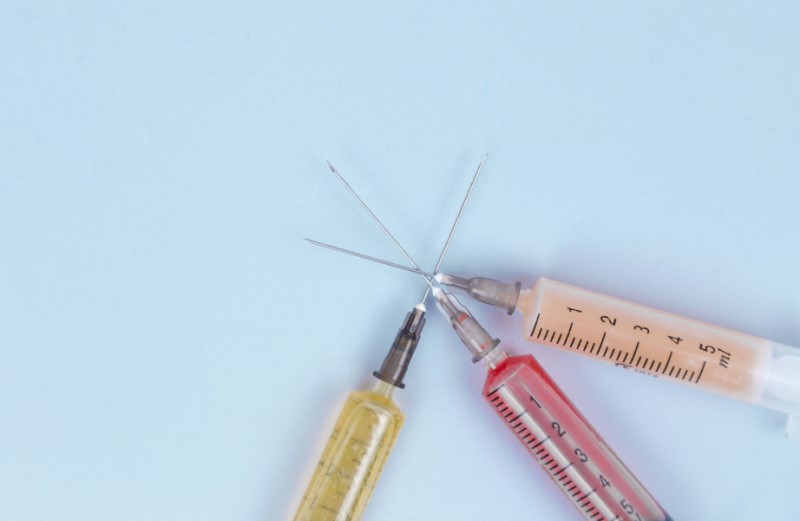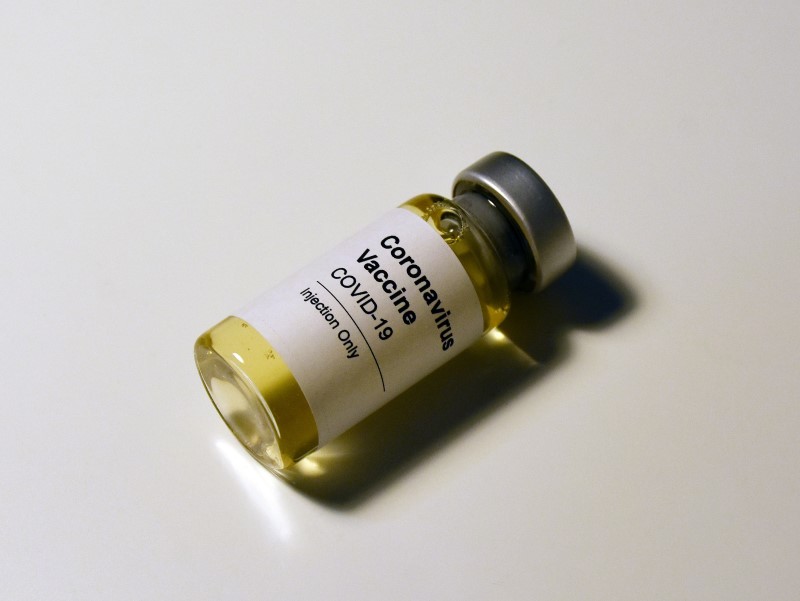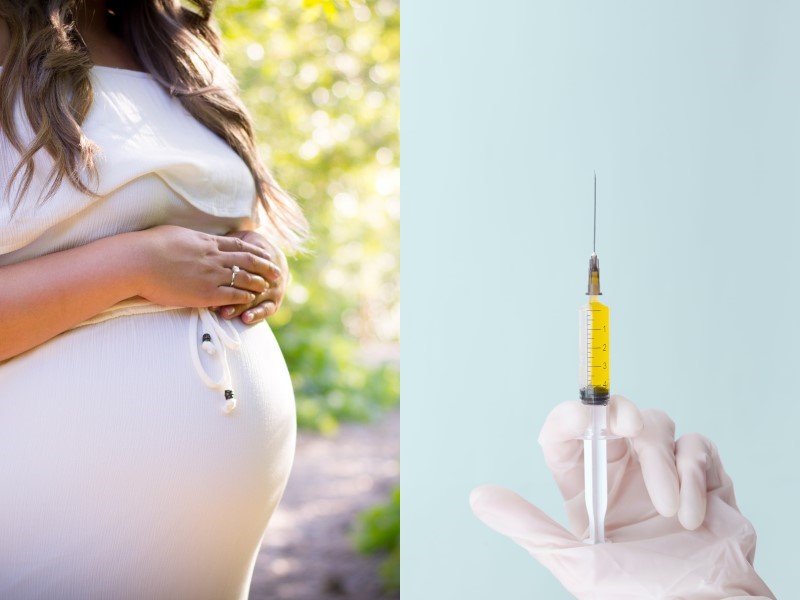Planning to get pregnant or already expecting a baby? Then it’s important to get certain vaccinations for pregnancy as this will keep both you and your baby healthy. After all, taking the recommended vaccines will allow your body to develop antibodies that help protect you and your newborn from serious illnesses. Ahead, we round up the most important vaccines for pregnant women to take and avoid. Plus, all the frequently asked questions you may have about the Covid-19 vaccination while pregnant or breastfeeding.
FYI: Vaccines containing killed or inactivated viruses are safe to be administered during pregnancy. On the contrary, vaccines containing live viruses are not recommended.
Important Vaccines For Pregnant Women To Take
Flu (Influenza) Shot For Pregnancy
One of the most essential vaccines for pregnant women to take is the flu vaccine for influenza. This vaccine offers the best protection for the mother and baby from flu-related complications, which may potentially arise a few months after giving birth. What’s more, this flu shot is completely safe for pregnant women as it is made from an inactivated virus.
Tdap Vaccine For Pregnancy
The tetanus toxoid, reduced diphtheria toxoid, and acellular pertussis (Tdap) vaccine is another important shot. It protects you and your baby from pertussis, aka the whooping cough disease. It is recommended to take one dose of the Tdap vaccine for each pregnancy, regardless of when you had your last shot. Optimally, the best time to receive the Tdap vaccine is between 27 and 36 weeks of pregnancy. That said, it is still safe to be taken at any time during pregnancy.
Recommended: Covid-19 Vaccine
With the ongoing coronavirus outbreak, the CDC recommends the Covid-19 vaccine for pregnant women. The vaccine will help protect you from severe illness due to the virus. Though risks are generally low, pregnant women are more prone to becoming severely ill if they were to contract the coronavirus, compared to those who are not pregnant. More questions will be answered in the FAQ section below.
Vaccines To Avoid For Pregnant Women

Live, Attenuated Influenza Vaccine (LAIV)
Also referred to as the nasal spray flu vaccine, this live influenza vaccine contains live viruses. As such, it is not recommended for pregnant women. It is only approved to be administered to healthy, non-pregnant people.
Human Papillomavirus (HPV) Vaccine
Though useful to prevent the risk of developing cervical cancer, the HPV vaccine is not recommended for pregnant women. If you’re keen on getting the HPV vaccine, it’s best to get it after your pregnancy. That said, some studies found no adverse effects in babies whose mothers received the vaccine.
Varicella (Chickenpox) Vaccine
Another vaccine not suitable for pregnant women is the one for varicella, or more commonly known as chickenpox. This is because the effects of the varicella virus on the foetus are unknown. Therefore, it should not be administered to pregnant women. Theoretically, chickenpox infection in pregnant women is linked to an increased risk of pneumonia that may require hospital admission. As for the foetus, there may be a small risk of limb abnormalities.
Measles, Mumps, And Rubella (MMR) Vaccine
Pregnant women should not get the MMR vaccine due to several theoretical risks. For starters, measles may increase the risks of spontaneous abortion or premature birth. Meanwhile, the risk of spontaneous abortion is said to increase if the pregnant woman gets mumps in her first trimester. As for rubella, it is suspected to cause miscarriages, stillbirth, as well as severe birth defects and congenital rubella syndrome including heart defects, intellectual disability, and deafness among others.
Certain Travel Vaccines
Unless your doctor is able to determine that the benefits outweigh the risks, pregnant women should not take travel vaccines such as yellow fever, typhoid fever, and Japanese Encephalitis (JE). Yellow fever vaccine is a live virus vaccine and its safety in pregnancy isn’t established yet. Meanwhile, Typhoid fever and JE vaccines are also discouraged as they haven’t been studied in pregnancy.
FAQ: Covid-19 Vaccination During Pregnancy & Breastfeeding

Is it safe for lactating and pregnant women to take the Covid-19 vaccine?
Yes. In fact, there’s increasing evidence suggesting that it is safe for both pregnant women and breastfeeding mothers to receive the Covid-19 vaccine as long as the benefits outweigh the potential risks. Moreover, there is no live virus in Covid-19 vaccines and thus, they will not cause any infection nor will they make you or your baby sick.
Should I get the Covid-19 vaccine if I am trying to get pregnant now or in the future?
Yes. It is recommended that those trying to conceive—whether at the present time or in the future—should get vaccinated for Covid-19. There is also no reason to terminate or delay pregnancy due to the vaccination, according to WHO.
Will taking the Covid-19 vaccine cause fertility problems?
No. Covid-19 vaccines will not cause any fertility issues in pregnant women and nursing mothers. In fact, there is no evidence suggesting this and even other vaccines would not cause fertility problems, whether in men or women.
No. There are no adverse effects found in breastfeeding and pregnant women (in all trimesters) who have taken Covid-19 vaccines. This includes mRNA, AstraZeneca, and Sinovac. It is actually beneficial to get the Covid-19 vaccination during pregnancy or while lactating. Reports have shown that the antibodies carried through the bloodstream or breast milk could help protect babies from the infection. As such, WHO does not recommend discontinuing breastfeeding after vaccination.
Which trimester should I receive the Covid-19 vaccination during pregnancy?
The best time to get the Covid-19 vaccination during pregnancy is between 14 and 33 weeks of gestation.
What else should I know about the Covid-19 vaccination while pregnant or breastfeeding?
Pregnant women are more likely to get severely ill if they contract the coronavirus. Hence, getting vaccinated during pregnancy will ensure both you and your baby are protected from severe Covid-19 illness. If you still have any doubts or have existing comorbidities like hypertension, diabetes, or obesity, it’s best to consult your doctor so you can make a better-informed decision.
Related: Hypertension In Pregnancy: An Overview Of The 4 Types, Symptoms, Risks, And How To Manage Them
Protect Yourself & Your Baby By Knowing What Vaccines Are Safe For Pregnant Women

By being aware of the important vaccines for pregnant women and taking them on time, you’ll be able to protect yourself and your baby after birth. This way, your baby can avoid illnesses before they are able to get vaccinated themselves. What’s more, certain diseases like flu and whooping cough are dangerous for infants. Thus, receiving the flu and Tdap vaccines during pregnancy will decrease their risks of those infections. As for Covid-19 vaccines for pregnant women and lactating mothers, you can rest assured that they’re safe and effective.
Have young children who are about to head back to face-to-face classes? Here’s how you can prep them to adhere to SOPs when school reopens. Plus, check out our guide on how to use an oximeter correctly if you plan on getting one!

